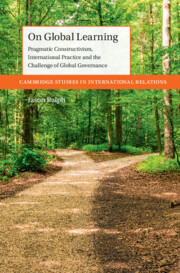 On Global Learning
On Global Learning Book contents
- On Global Learning
- Cambridge Studies in International Relations: 165
- On Global Learning
- Copyright page
- Dedication
- Epigraph
- Contents
- Acknowledgements
- 1 Introduction
- 2 Norms and Practice
- 3 Habit, Habitus and Conscientious Reflection
- 4 Learning, Democracy and the Realist Critique
- 5 Pragmatic Constructivism and the Challenge of Global Governance
- References
- Index
- Cambridge Studies in International Relations: 165
3 - Habit, Habitus and Conscientious Reflection
from Part I
Published online by Cambridge University Press: 07 September 2023
- On Global Learning
- Cambridge Studies in International Relations: 165
- On Global Learning
- Copyright page
- Dedication
- Epigraph
- Contents
- Acknowledgements
- 1 Introduction
- 2 Norms and Practice
- 3 Habit, Habitus and Conscientious Reflection
- 4 Learning, Democracy and the Realist Critique
- 5 Pragmatic Constructivism and the Challenge of Global Governance
- References
- Index
- Cambridge Studies in International Relations: 165
Summary
This chapter addresses the book’s first question by focusing on what classical Pragmatism can tell us about the ‘practice turn’ in International Relations. It assesses the value – both descriptive and normative – of defining practice as pre-reflexive or habitual. Dewey was clear: habits can be useful, but only if those subject to their hold can improvise when practice produces unwanted consequences. Applying this to International Relations, the chapter shows how a failure to adequately reflect on the situational value of an ideological commitment to ‘democracy promotion’ – what Bourdieusian-informed Practice theory might call a Western ‘habitus’ – contributed to the maladapted response to the humanitarian crises in Syria and Myanmar. This again points to the centrality of reflection, deliberation, judgement and learning to the Pragmatist approach. The chapter develops that argument by examining how Dewey’s ‘pedagogic creed’ aimed to put individuals and societies in control of their habits and how his critique of the unhelpful hierarchies in formal education was extrapolated to form a theory of social learning, which included an emphasis on the role democracy plays in facilitating the reflexivity and deliberation.
- Type
- Chapter
- Information
- On Global LearningPragmatic Constructivism, International Practice and the Challenge of Global Governance, pp. 74 - 102Publisher: Cambridge University PressPrint publication year: 2023


